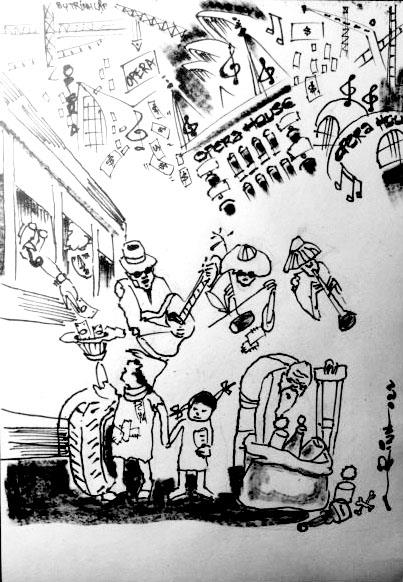 Talk Around Town
Talk Around Town

 |
| Illustration by Trịnh Lập |
by Nguyễn Mỹ Hà
You know what I am talking about.
For the past weeks, Hanoians have been up and talking non-stop about a new project to build a 1,600-seat opera theatre on the site of the famous one-hundred petal Đầm Trị lotus pond.
I find it necessary to say upfront that I am one of many Hanoians who would stand up against this project. My point is straightforward: leave the last special lotus of the West Lake in their habitat to grow. Hanoians need them, and Việt Nam at large needs them.
Do not get me wrong. I love opera and believe that Vietnamese, and Hanoians in particular, should enjoy it, but in another theatre built elsewhere, not at the sacrifice of a precious water feature of the city.
Opera, in many ways, is like the chèo of Việt Nam. It's fun and often, tragically, sung in the most beautiful nuances of the human voice. Singers in Việt Nam learned the operatic art and returned and gave Vietnamese songs a new and refreshing beauty.
I, for one, learned Italian to understand La Traviata, La Boheme, and The Barber of Seville in its original language and, at some point, wanted to spend a year or more learning the language in its country. When we visited Seville in Spain, I was so excited to look around for any traces of the legendary barber, that I left our iPad in the cab.
Do we need another operatic theatre? Yes, but not yet. The Hà Nội Opera House is not only a historic building. Its acoustics for traditional operatic singing, without microphones, are still intact.
The 870-seat theatre stages how many operas a year? How many people get to see it? The closest to an opera, a musical, Les Miserables, was staged at the opera for less than 10 shows in 2020 and 2021. The show was great, but it needed to run longer with more performances for the artists to hone their skills further and for spectators to enjoy the musical based on the novel they have loved for so many years.
If you oppose the building of a western-style operatic theatre, then would you support if the site gets turned into an open theatre for Vietnamese performing arts like chèo, tuồng or cải lương? Even as an avid supporter of traditional singing art forms, I must, sadly, say no.
There must be no other building on the Đầm Trị lotus pond, even if the proposed design was penned by world-famous architect, Renzo Piano.
"I am a fan of Renzo Piano," exclaims a Vietnamese architect. "In my eyes, as a fan of Hà Nội, a fan of the West Lake, every week, I cycle around the lake to enjoy the open and fresh air by the lake. In the eyes of an architect, I find that West Lake has slowly been eaten up."
"The beauty of the West Lake is the fog that embraces the lake in the morning, giving it an infinite beauty of an immense world without borders. The West Lake has been invaded from different viewpoints and tall buildings around it. Now what's important is to keep the spaces instead of trying to fill them with more buildings."
The space he's talking about is not just the physical space but the place where memories of Hanoians and fellow citizens from other corners of our country keep for Hà Nội. Sometimes by not doing anything, you have done a great deal. Leave the West Lake in peace!
Unlike this architect, who studied at the Chu Văn An high school, located on the southern bank of the lake, another architect, Hồ Thiệu Trị, a Vietnamese-French architect, whose renovation of the Opera House got mixed reviews from the public, said that the new Hà Nội Opera, designed by Renzo Piano, would be a new landmark for the city.
The new opera will be built to impress. It will send the message across the world that we in Hà Nội are cultured. We know how to contemplate the beauty of arts and architecture. It may impress world leaders who may come to the city for a conference and go home after a few days.
But I'm afraid it won't impress international tourists who stroll along the West Lake to take in the beauty of the small pagodas dotted around the lake or take a biking tour around it.
This protest is not against developers. Investment in arts has been scarce, and it needs to be put to good use.
The main issue has to do with West Lake. If the opera gets built in a new-town project, it may not receive so much scrutiny and may even receive affection.
It is not for me to tell Hanoians and Vietnamese, who have travelled the world, how to treasure their own heritage.
The West Lake is part of our common culture. The West Lake and its one-hundred petal pink lotuses, which create among the best Vietnamese tea, is indeed an invaluable cultural heritage.
Though not yet recognised by any world cultural establishment, it must be protected by all of us. The philosophy of the lotus, growing up in a mud pond, but blooming in beauty and usefulness is a culture that needs to be preserved for many generations to come.
We should leave the West Lake as it is, making the remaining lotus ponds a national treasure.
A new operatic theatre designed by Renzo Piano will be more appreciated if it is placed elsewhere, perhaps in a city of music adjacent to Hà Nội. Then we would all be happy and give applause fitting of the great art form that is opera. VNS




